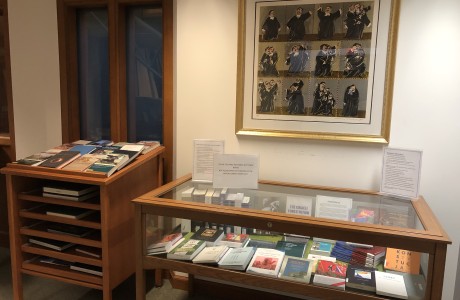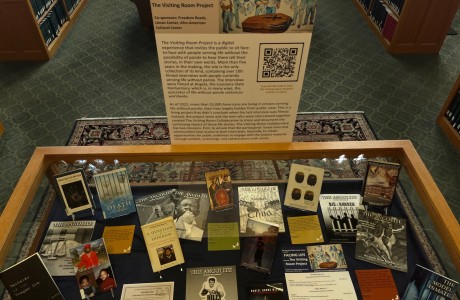Pufendorf Congratulates All Those Graduating and Sends His Best Wishes To Everyone for an Engaging and Productive Summer!
The Foreign and International Law Collection staff received the following reference question this week:
“In Pufendorf’s De Jure Naturae et Gentium Libri Octo there is reference to Johannes Friderich Hornius as the author of De Civitate, the author index in edition of the Carnegie Classics of International Law series notes him as Johan Friedrich Horn (German jurists).
I see the Yale University Library has the following holding: Joh. Frid. Hornii Briga-Silesii Architectonica de civitate; Horn, Johann Friedrich, 1629?-ca. 1665; Architectonica de civitate
I have the following query: Is there an English or French translation of Architectonica de civitate; and if so, which library is holding it?’
Who is/was Pufendorf? (We’ll save Hornius for another time)

Pufendorf Is the Foreign and International Law Collection’s totemic dappled rabbit, sitting at the foot of the stairs going into L1, the lower level of the Law Library. He welcomes all who visit the Foreign and International Law collection with a message of “love,” which he bears on his sign.
In a contest open to students it was suggested Pufendorf was the best name suggested. (Could it be that the name resembles Puff the Magic Dragon?). Our love bunny was acquired in 1992 by Dan Wade at the Kutztown, PA Folk Festival. Our love bunny was carved in the Philippines and was designed by Paul Weir of Rittman, Ohio. On May 21, 2003, the roof fell in on him when the bomb exploded in the Law School. He remains as a memorial to the extraordinary perseverance of Yale Law students. Not only has he withstood bomb blast, but a few years before the bomb he was kidnapped by a group of 3L’s and ransomed for a keg of beer.
During graduation please come and visit Puf. Rub his nose for good luck and more love in your life! While you are here browse the collection for signs of hope in the books on the law of war and peace and human rights and notice the exhibit on Franz Kafka in our new exhibit case.
Pufendorf was named after Baron Samuel von Pufendorf (1632-1694), a German jurist and political philosopher. Among his major contributions were his revisions of the natural law theories of Hugo Grotius and Thomas Hobbes.
Born in Saxony of a Lutheran pastor in 1632, Pufendorf studied theology at the University of Leipzig before turning to the study of law at the University Jena where he read Hobbes and Grotius. In 1658 he became a tutor to the children of the Swedish ambassador to Denmark. When conflict broke out he was imprisoned for eight months. There he wrote one of his major works, Elementa jurisprudentiae universalis libri duo, a system of universal law (1960).
Following his release, in 1661 he accepted a Chair of Natural Law and Nations, the first of its kind in the world, at the University of Heidelberg. He was forced to resign in 1668 following his attack on a tax imposed on official documents. He next went to the University of Lund as a professor of natural law, and in 1672 published his great work on nature and the law of nations, De Jure naturae et gentium libri octo, which proposed his just war theory. Here he argued that every human being on the basis of human dignity has a right to equality and freedom. He based his theory of natural law on man as a social being. Against Hobbes, he argued that the state of nature was peace, not war.
In 1677 Pufendorf became the Swedish royal historian. He published his De habitu religionis christianae ad vitam civilem, drawing limits between civil and ecclesiastical power.
In 1688 Pufendorf became the historian and privy councilor for the Elector of Brandenburg and in 1694 the King of Sweden made him a baron. Pufendorf died shortly thereafter.
While Pufendorf passionately disputed with Leibnitz, he is said to have influenced Blackstone and Montesquieu.
-----Daniel Wade


